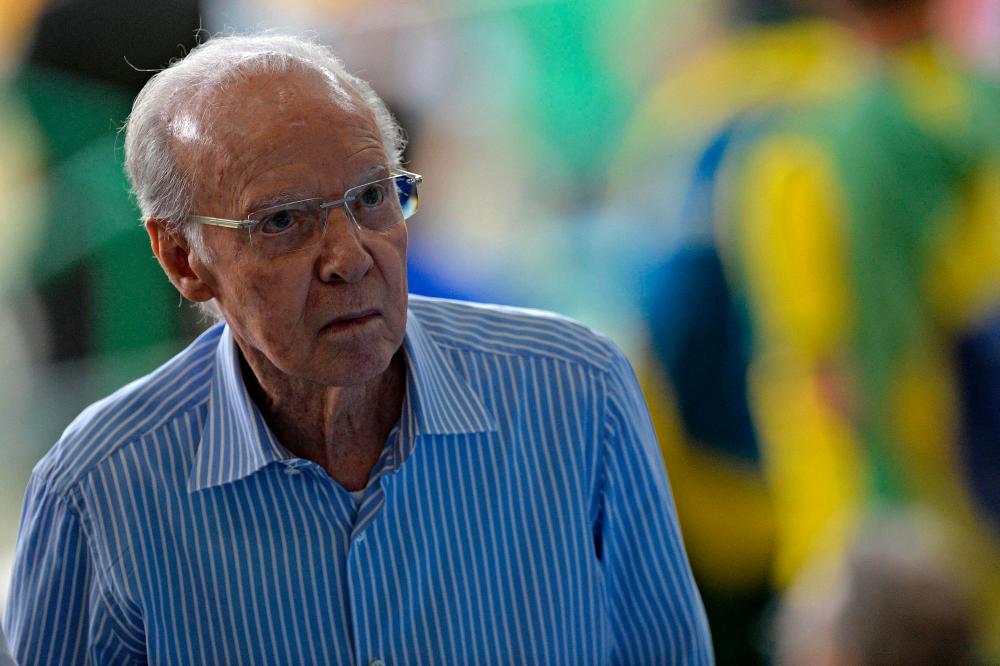SAO PAULO: The first person to win the FIFA World Cup as both a player and coach, Mario Zagallo was as instrumental a figure as any in Brazil's rise to prominence as a global football power.
Zagallo, who died Friday at the age of 92, was the only surviving member of the Brazil team that lifted the 1958 World Cup trophy, the country's first title and one that eased the pain of a traumatic defeat by Uruguay at the Maracana eight years prior.
“I was at the Maracana for that fateful loss to Uruguay. I was a soldier and it was my job to keep people off the pitch,“ said Zagallo of a result that prompted national mourning.
“I’ll never forget the silence, the sadness and the disappointment of that defeat.”
His legendary teammate Pele died in December 2022.
While that memory remained vivid, Zagallo would do his utmost to relieve the anguish by leaving his fingerprints on four of Brazil's five World Cup triumphs.
Emerging from the amateur ranks during the 1950s, Zagallo, a diminutive left winger, embodied Brazil's quest to blend attacking flair with defensive solidity, combining his own exquisite technique with admirable commitment.
He won five Rio de Janeiro state championships with Flamengo and Botafogo. He only made his Brazil debut at the age of 26, shortly before the 1958 World Cup in Sweden, but became an integral member of the team, winning 37 caps.
- Brazil's run of success -
The tournament, which launched 17-year-old sensation Pele on the world stage, ended with Brazil beating the hosts 5-2 in the final. Zagallo scored his team's fourth and then set up Pele for the final goal.
Four years later, Zagallo played every single minute as a Garrincha-inspired Brazil overcame an injury sustained by Pele in the group stage to retain their crown, coming from behind to beat Czechoslovakia 3-1 in Santiago.
After retirement, Zagallo returned to the game as a manager, taking over former club Botafogo and leading them to two more state titles in a country under a military dictatorship.
Joao Saldanha had guided the national team to the 1970 World Cup in Mexico but was cast aside before the tournament in favor of Zagallo. Saldanha fell out with Pele and refused to bow to demands of then-president Emilio Garrastazu Medici on squad selection and, as a known Communist sympathizer, his fate was sealed.
Zagallo, just 38 at the time, inherited an exceptionally gifted squad -- including Pele, Carlos Alberto, Jairzinho and Rivelino -- and oversaw six wins from six games as Brazil captured the title for a third time in four attempts.
Years ahead of his time as a player, Zagallo quickly demonstrated his merit as a coach. He later reflected on the fabled 1970 World Cup, dominated by a spectacular Brazilian display, as his “greatest memory as a manager”.
A counter-intuitive type who believed in the number 13, Zagallo's unabating hunger for success brought further domestic titles with Fluminense and Flamengo before he ventured abroad to Kuwait, winning the Gulf Cup in 1976 and reaching that year's Asian Cup final.
- Tireless pursuit of glory -
After taking United Arab Emirates to Italy in 1990, Zagallo was called on by Brazil for a final time, as technical director for the 1994 World Cup in the United States.
Together with his protege, Carlos Alberto Perreira, he guided the side to another world title after a dull final against Italy led to a penalty shootout.
His tilt at a fifth success fell agonizingly short in 1998, when Ronaldo, the pre-eminent player of his generation, suffered a mysterious fit before the final and Brazil slumped to a 3-0 defeat to hosts France.
Zagallo's durability and lasting aura ensured he was a natural choice to stand in briefly for the departed Luiz Felipe Scolari following Brazil's fifth World Cup victory in 2002.
“He was one of the greatest Brazilian players of his generation and, after winning the World Cup four times, he has left a permanent mark on Brazilian football,“ said Ronaldo of the man nicknamed “The Professor”.
His wife of 57 years, Alcina de Castro, passed away in 2012. -AFP









